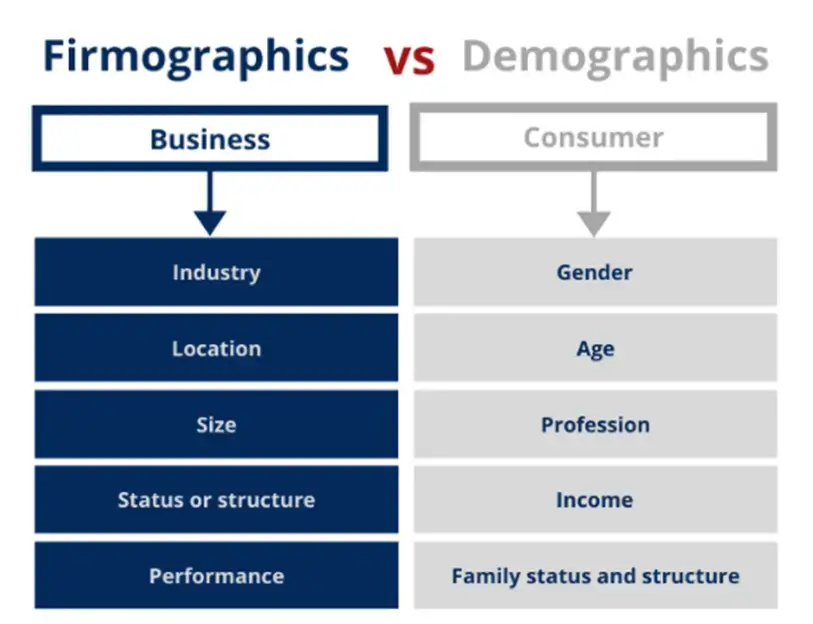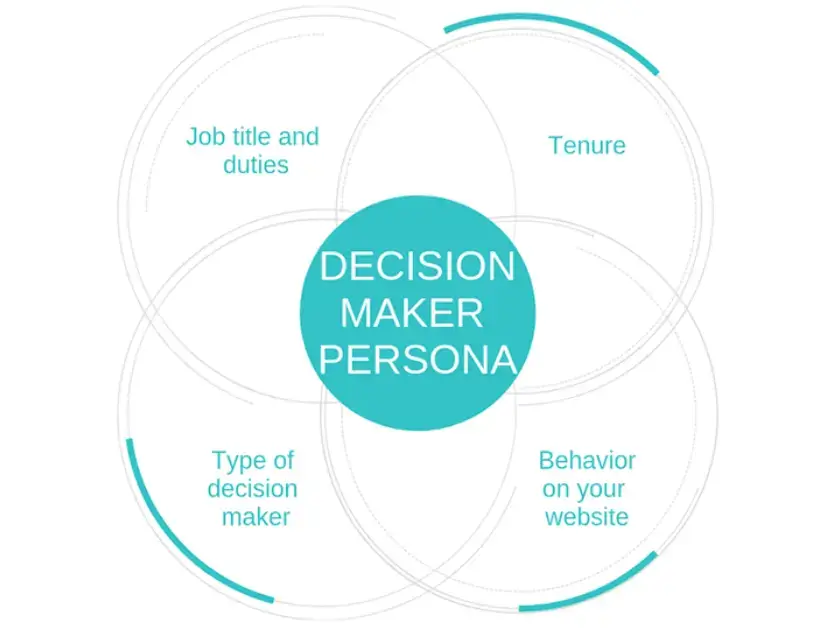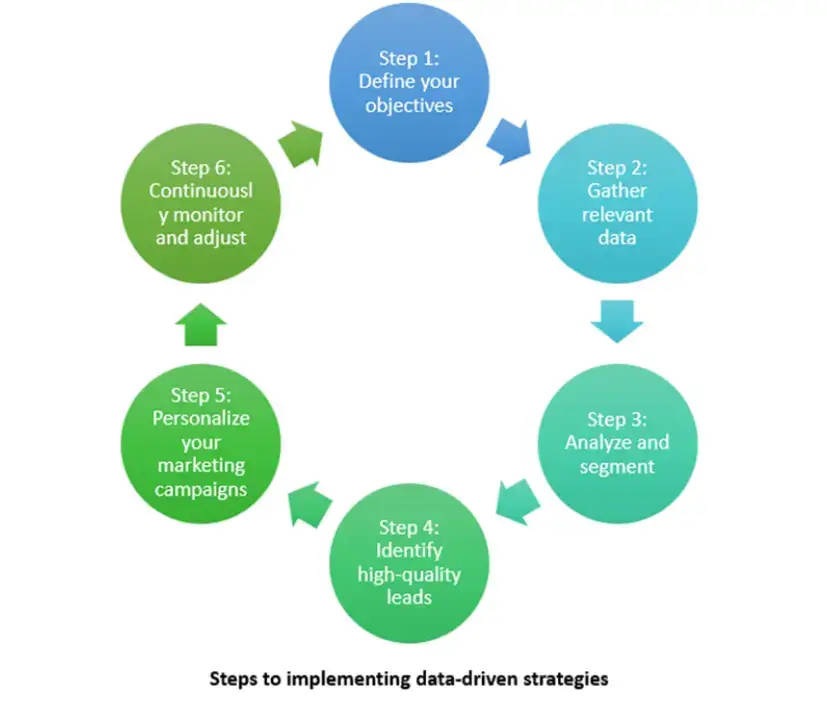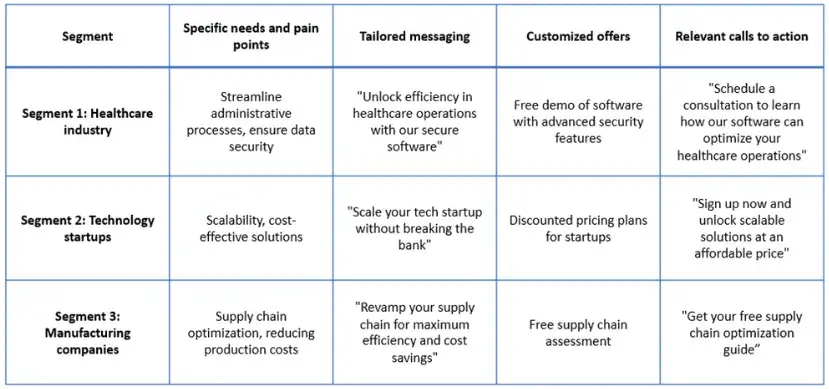In B2B sales, reaching and engaging key decision-makers is essential. It significantly boosts deal closures and lead conversions.
That's why targeting high-quality leads is a top priority for B2B companies. By finding the right decision-makers, businesses position themselves for success in B2B sales.
Data-driven strategies play a huge role in identifying high-quality leads. Research by McKinsey & Company shows that data-driven B2B sales strategies led to impressive results, including above-market growth and significant EBITDA increases (15-25%).
It highlights the impactful role of data-driven strategies in driving B2B business growth and financial performance.
This article will explore data-driven strategies for B2B lead generation, their benefits, and how to implement them.
Data-Driven Strategies in B2B
Data-driven strategies are all about using data to make smart digital marketing decisions.
When it comes to lead generation, these strategies utilize analytics tools to identify and prioritize leads that have a higher chance of converting into valuable customers.
Here are some strategies commonly used in B2B data analysis.
In this article:
- Firmographics
- Job title and role analysis
- Purchase history and buying patterns
- Industry-specific trends and events
- Intent data analysis
-
Firmographics
While demographics involves analyzing consumers, firmographics involves analyzing characteristics like industry, company size, location, and revenue to target specific B2B leads.

For example, a software company may target smaller healthcare businesses in specific regions and adjust their approach to meet their unique needs.
-
Job title and role analysis
Analyzing job title data allows businesses to identify decision-makers within target companies, prioritizing their efforts and tailoring messaging to appeal to individuals with purchasing authority.

For example, a marketing automation platform may specifically target leads with job titles like "marketing director" or "chief marketing officer," as they play a pivotal role in purchasing marketing software.
Check out this revpilots guide to hire full and part time CMO.
-
Purchase history and buying patterns
When businesses understand a lead's past purchases and preferences, they can customize their sales approach to meet specific needs and improve their chances of securing valuable contracts.
Let's take a supplier of office equipment as an example. They can identify companies that regularly make large bulk purchases and know when they usually happen.
This way, they can concentrate on these leads and offer personalized solutions that meet their needs.
-
Industry-specific trends and events
Staying updated on the latest industry trends helps companies become valuable partners. It enables them to provide customized solutions that tackle specific industry challenges.
For example, an e-commerce platform could target companies struggling with online customer retention. They can offer personalized solutions like loyalty programs to help improve customer engagement and retention rates.
-
Intent data analysis
Companies can improve their chances of conversion by leveraging intent data to deliver relevant messages.
For instance, a CRM software company might analyze intent data to target leads actively researching CRM solutions. This approach ensures that the company's messages align with these leads' specific needs.
These data-driven strategies enable B2B companies to target leads and achieve better sales outcomes precisely.
Key Steps to Implementing a Data-Driven Strategy
To effectively implement data-driven strategies for lead generation, follow these key steps:
- Define your objectives
- Gather relevant data
- Analyze and segment
- Identify high-quality leads
- Personalize your marketing campaigns
- Continuously monitor and adjust

Step 1: Define your objectives
Clearly define your lead generation goals. For example, you may aim to attract leads from the healthcare industry who are decision-makers in their respective organizations.
Your conversion targets could include a specific percentage increase in lead-to-customer marketing conversion rates.
Step 2: Gather relevant data
Collect and organize relevant data from various sources such as CRM systems, marketing platforms, surveys, and website analytics.
For instance, you may gather demographic data, online behavior patterns, and past purchase history of potential leads.
Step 3: Analyze and segment
Utilize data analytics tools to analyze the collected data and uncover patterns and trends.
For example, you can segment leads based on their job titles, company size, or geographic location. It allows you to create targeted marketing campaigns tailored to each segment.
Step 4: Identify high-quality leads
Based on your data analysis and segmentation, pinpoint leads with the highest potential for conversion.
Look for common characteristics or behaviors that indicate a strong fit for your product or service. For instance, you may identify leads previously interested in similar offerings.
Step 5: Personalize your marketing campaigns
Create customized marketing campaigns that directly address your high-quality leads' specific needs and pain points.
For example, you can tailor your messaging, offers, and calls to action to resonate with each segment and provide relevant solutions to their challenges.

Personalization examples
Step 6: Continuously monitor and adjust
Regularly monitor the performance of your marketing campaigns and make necessary adjustments. Analyze key metrics such as conversion rates, engagement levels, and return on investment.
For instance, you may optimize your campaigns based on real-time insights to improve results and maximize your lead generation efforts.
Conclusion
Data-driven strategies provide B2B companies with a powerful approach to identifying and targeting high-quality leads.
By leveraging analytics tools, you gain valuable insights into your target audience's behavior, preferences, and needs.
This understanding allows you to optimize your lead generation efforts, enhance lead quality, improve targeting, and drive revenue growth.
Author Bio:
Soren Rosenmeier is a Senior Partner and International CEO of Right People Group and Onsiter.com. He has over 12 years of experience in the recruitment and IT industry and can be followed on LinkedIn.



